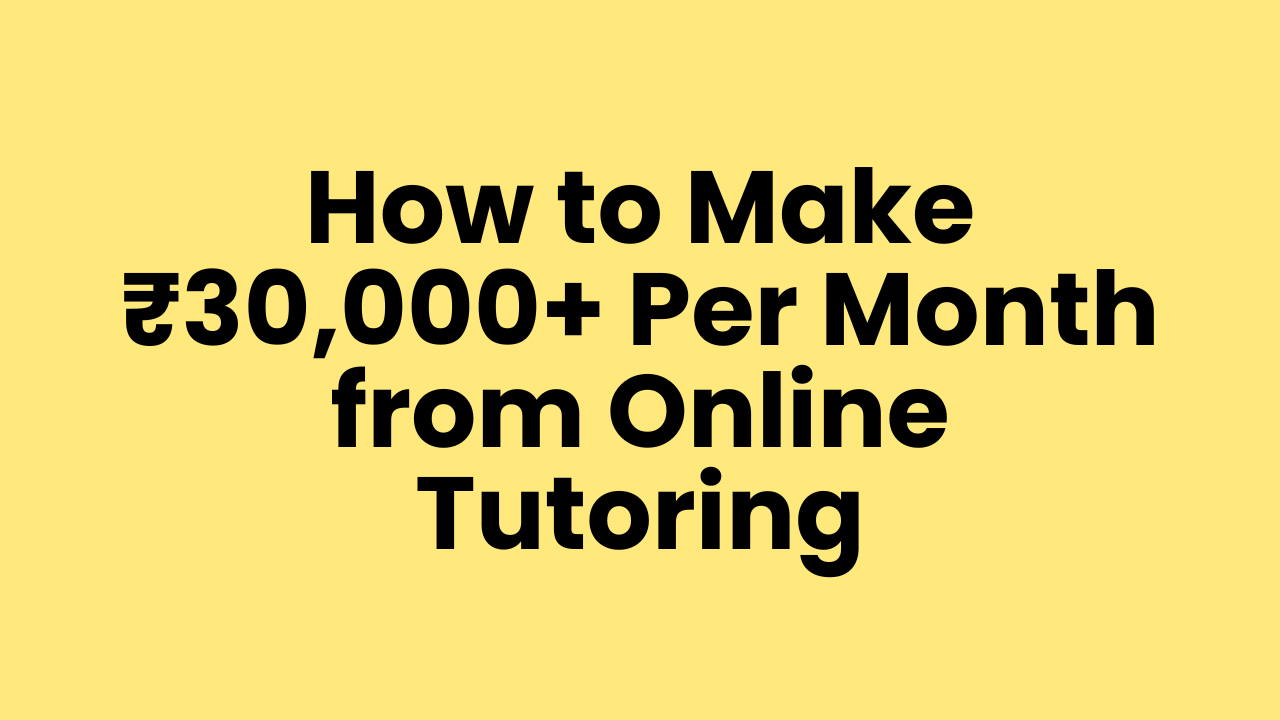The demand for online education has skyrocketed in India, making online tutoring a lucrative career option. With the right strategy, dedication, and tools, you can earn over ₹30,000 per month from online tutoring. This guide will walk you through the steps, platforms, and best practices to achieve financial success in online teaching.
Why Choose Online Tutoring in India?
Benefits of Online Tutoring
- Flexibility: Teach from anywhere and set your own schedule.
- Low Investment: Requires only a computer, stable internet, and teaching skills.
- Scalability: Teach multiple students simultaneously, increasing earnings.
- High Demand: Growing demand for subjects like Math, Science, English, and competitive exams like JEE, NEET, and UPSC.
Steps to Start Your Online Tutoring Career
Identify Your Niche and Strengths
Before starting, determine the subject(s) you are proficient in. Some high-demand niches include:
- Academic Tutoring: CBSE, ICSE, State Board subjects.
- Competitive Exams Coaching: JEE, NEET, UPSC, CAT.
- Language Training: English, Hindi, Foreign languages.
- Skill-Based Courses: Coding, Digital Marketing, Graphic Design.
- Hobby Classes: Music, Dance, Yoga, Cooking.
Choose the Right Online Tutoring Platforms
There are various platforms that connect tutors with students. Some of the best options in India are:
Platform | Features |
|---|---|
Vedantu | Interactive one-on-one and group tutoring |
Unacademy | Best for competitive exam preparation |
Byju’s | High-paying, structured curriculum |
UrbanPro | Flexible subject options |
Chegg | Answer-based tutoring for global students |
Udemy | Best for creating and selling courses |
Teachmint | Mobile-first teaching platform |
Superprof | Global reach, per-hour payment |
Set Up Your Teaching Infrastructure
Invest in basic infrastructure to enhance your teaching quality:
- Laptop/PC with Webcam: Essential for interactive sessions.
- High-Speed Internet: Ensures smooth video and audio communication.
- Digital Writing Pad: Helps in online whiteboarding.
- Professional Lighting and Background: Improves video clarity and student engagement.
Create an Attractive Tutor Profile
Your profile is your first impression. Include:
- A professional photo
- A compelling bio showcasing expertise and experience
- Student reviews and testimonials
- Demo video of your teaching style
Decide on Pricing and Packages
Earnings depend on your pricing model. Here’s an estimated breakdown:
Experience Level | Average Earning Per Hour |
Beginner (< 1 year) | ₹150 – ₹300 |
Intermediate (1-3 years) | ₹300 – ₹500 |
Expert (3+ years) | ₹500 – ₹1,500 |
You can offer:
- Per-hour rates (common for live tutoring)
- Monthly packages (best for long-term students)
- Recorded courses (one-time investment, passive income)
Market Yourself Effectively
Use multiple marketing channels to attract students:
- Social Media (Facebook, Instagram, LinkedIn): Share educational content and success stories.
- YouTube: Create free tutorial videos to showcase expertise.
- WhatsApp Groups & Telegram Channels: Engage students and parents directly.
- SEO & Blogging: Write articles on topics like “Best Online Tutors for Class 10 in India.”
- Google My Business: List yourself to attract local students.
Engage and Retain Students
To ensure long-term success:
- Offer Free Demo Classes: Builds trust and attracts new students.
- Provide Personalized Learning Plans: Cater to individual student needs.
- Use Interactive Tools: Kahoot, Google Classroom, and Zoom Whiteboard make learning engaging.
- Encourage Feedback: Helps in improving teaching quality and gaining referrals.
Expand and Scale Your Earnings
Once established, increase income by:
- Teaching Groups Instead of One-on-One: Earn more per session.
- Creating Online Courses: Platforms like Udemy and Skillshare allow you to sell pre-recorded courses.
- Starting Your Own Tutoring Website: Build a personal brand and charge premium rates.
- Hiring Assistant Tutors: Delegate tasks and increase the number of students.
Frequently Asked Questions
Earnings range from ₹10,000 to over ₹1,00,000 per month depending on expertise, platform, and student base.
Formal degrees help but are not mandatory. Strong subject knowledge and teaching skills are more important.
Math, Science, English, Coding, and competitive exams like JEE, NEET, and UPSC have high demand.
Yes, platforms like Vedantu and Unacademy allow you to start for free, requiring only a laptop and internet.
Leverage online platforms, social media, referrals, and free demo classes to attract students.
Yes, many tutors earn full-time income. However, it can also be done part-time for extra income.
Research competitors, consider your experience, and offer tiered pricing (basic, standard, premium).
Not always, but having certifications like TEFL (for English) or subject-specific credentials can add credibility.
Zoom, Google Meet, Microsoft Teams, and digital whiteboards like Miro and Jamboard are great tools.
Hire tutors, create recorded courses, build a personal brand, and expand to international students.

With years of experience in career guidance, online income strategies, and skill development, Aman shares practical insights on CareerKendra.com, a platform designed to empower professionals, students, and freelancers with valuable knowledge.

